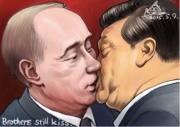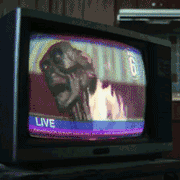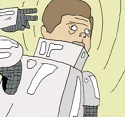|
Bar Ran Dun posted:lmao what too much twitter does to a mfer
|
|
|
|

|
| # ? May 26, 2024 11:07 |
|
Goast posted:then why do all the marines attached to the sgc use m4s "colonel oneill, sg3 got owned by jaffa again"
|
|
|
|
Justin Tyme posted:They may have "parity" in technology but not quantity. The Russian and Chinese navy are tiny compared to the US for example, and the US Navy is actually one of the largest air forces in the world on top of that. Whether or not hypersonic cruise missiles can negate that disadvantage though is another question. The Chinese navy has been getting quite big in recent years, they are just behind in carriers and amphibious warfare ships but they have a lot of missile cruisers/destroyers/frigates. It is why the Ukrainian war is such a useful distraction because China is rapidly arming while all of this is going on.
|
|
|
|
Ww3 will be fought with hypersonic nuclear weapons Ww4 will be fought with my dick and balls
|
|
|
|
A Buttery Pastry posted:You can find people arguing that the US has 4 of the 5 most powerful air forces on Earth in terms of material. Obviously not all of those are fully kitted out like a proper air force, and those rankings are highly susceptible to bias, but it does speak to the US pouring a ton of money into that poo poo. Literally a "let's show them what a bloated, runaway military budget to do" Egg Moron posted:Ww3 will be fought with hypersonic nuclear weapons Talk about envying the dead
|
|
|
|
Ww3 will be fought with nuclear weapons Ww4 will be gay
|
|
|
|
Thermonuclearhomowar
|
|
|
|
https://www.youtube.com/watch?v=ASb32u9g6OM&t=90s
|
|
|
|
taken from "The Mons Myth" by Terence Zuberquote:European armies are often criticised for failing to recognise the de- structive power of machine-gun fire. As a consequence, practically all historians maintain that the infantry attempted to attack machine guns in mass formations and were mown down in rows. In fact, German tactical doctrine fully recognised the power of machine guns. The Exerzier- Reglement was supplemented in 1909 to provide doctrine for the employ- ment of machine guns: the German army therefore had more than three complete annual training cycles to practise with machine guns. The Handbook said that machine guns had attained an ‘extraordinary importance’. They were capable of generating the greatest firepower in the smallest area and in the shortest possible time, quickly producing a decisive effect at the desired place. Immanuel said that ‘the machine gun is the weapon of the future, of immense importance’. there's a certain crack-ping element to this book because you read something like "The Guns of August" and it might describe Uhlans charging headlong into/against machiine gun fire and then this book is telling that "no, it didn't loving happen that way, dumbass" quote:Although individual marksmanship was essential, the goal of German fire tactics was to direct the fire of the entire platoon against a specific enemy target. The platoon was the fire unit in German tactics and the platoon leader, through fire commands, designated the target and the range. The fire of eighty men would not fall at exactly the same range; some would go over and some fall short (see Figure 2). If the target were at 700 metres this dispersal would create a beaten zone, called a ‘sheaf’ (Garbe), from 640 metres range to 760 metres. The platoon would also spread its fire along the width of the target. The objective of German fire tactics was to place this beaten zone on the enemy unit. The impact of at least some of these rounds would throw up dirt, allowing the platoon leader to judge if his fire was landing properly and adjusting it if it was not. Squad leaders were trained to direct their squad’s fire in the same manner. This system was especially important at medium range (800– 1,200 metres): while individual aimed fire at medium range was difficult, the platoon’s beaten zone could be effective. oh how about this passage, which says A. the German army operated all the way down the squad level, even as early as the 1880s, where WWI histories might have you believe that that level of control/decentralization didn't happen until much later, usually with a reference to stosstruppen doctrine B. they were using rifle-fire as the "fire" portion of "fire-and-maneuver" tactics at a range of nearly a kilometer, almost as though it's lots and lots of small pieces of artillery. This is exactly the sort of thing that Chinese and North Korean armies would train themselves to do some 40 years later! gradenko_2000 has issued a correction as of 06:53 on Mar 14, 2022 |
|
|
|
I found an interesting title about how the US military does not actually make much use of much lauded technology: US Military Innovation since the Cold War: Creation Without Destruction This book explains how the US military reacted to the 'Revolution in Military Affairs' (RMA), and failed to innovate its organization or doctrine to match the technological breakthroughs it brought about. Many called for the transformation of the US military in the years after the end of the Cold War, seeking the changes in organization and doctrine that would complete the RMA innovation and offer the US the capability to perform a wide variety of missions cheaply and effectively. This volume describes the origins, uses, and limits of the RMA technologies, examines how each of the five US armed services (categorising the Special Operations as a separate service) made their adjustments both to the technologies and the use of force, and how the role of the civilian officials and the defense industry altered in this process of change and avoidance of change. The book examines the internal politics of the services as well as civil/military relations to identify the external pressures on the services for significant change in their doctrine and weapons. Many have noted the failure of the services to innovate in what can be called the 'Second Inter-war Period' (the years after the Cold War). This book offers explanations for this failure and arguments about the possible range and desirability of military innovation in the post-Cold war era. This book will be of great interest to students of strategic studies, US defence politics, military studies, and US politics.
|
|
|
|
gradenko_2000 posted:
The impression I've always had is that it was a combination of industrial weaponry that really made progress on the western front impossible, rather than Europeans not understanding how powerful machineguns were. Like that it was a combination of barbed wire, machineguns, artillery, spotter aircraft, and chemical weapons that turned every open field into a death trap.
|
|
|
|
gradenko_2000 posted:taken from "The Myth of Mons" by Terence Zuber It’s a fantastic book eh? The Rocky Road to the Great War: The Evolution of Trench Warfare to 1914 is similar for showing that trenches were nothing new, and all of the European armies expected they would need to use them if they ran out of space to manoeuvre. Great War examines the evolution of field fortification theory and practice between 1877 and 1914. The technical and intellectual developments during this period were critical to the nature of the First World War. It is well known that the technology of the defensive (machine guns, barbed wire, and artillery) had become much more powerful in the decades prior to 1914. The challenge this combination of enhanced defensive technology presented to the offensive is familiar to us today.What is less well known is the evolution in the design of field fortifications, from above to below ground, which massively enhanced the power of the new defensive technology. Study of the evolution of field fortification construction has largely been neglected despite the fact that the battlefield landscape of the First World War, indeed industrial warfare in the twentieth century, owes its existence to the changes that occurred therein. It was the combination of new technology and new types of field fortification that was to reach a bloody dénouement in the Great War.Based largely on primary sources—including French, British, Austrian, and American military attaché reports—Murray’s enlightening study is unique in defining, fully examining, and contextualizing the theories and construction of field fortifications before World War I. Frosted Flake has issued a correction as of 00:45 on Mar 11, 2022 |
|
|
|
Pener Kropoopkin posted:The impression I've always had is that it was a combination of industrial weaponry that really made progress on the western front impossible, rather than Europeans not understanding how powerful machineguns were. I’ve read that it’s the evolution of the same problem that started on the US Civil war and in the Mexican Revolution. I’ve always gotten the impression it changes when you get real combined and and assault rifles. so radios, assault rifles, tanks, good artillery and planes together and coordinated.
|
|
|
|
Bar Ran Dun posted:I’ve read that it’s the evolution of the same problem that started on the US Civil war and in the Mexican Revolution. What do you mean by "it changes?" Like the dynamic of the front or tactically or what? The biggest change on the western front didn't even come from tanks, it came from the Germans implementing stormtrooper tactics - which were already too little too late, because the whole country was being starved from blockade and the central powers were collapsing around them.
|
|
|
|
I think its more the change from WW1 to 2, especially in that radio makes it so artillery is much easier to use offensively
|
|
|
|
StashAugustine posted:I think its more the change from WW1 to 2, especially in that radio makes it so artillery is much easier to use offensively and it’s not really even all the way there in WWII until the very end. a lot of things came together all at once and were new. think about artillery and range tables vs fire control systems. there’s this jump in accuracy and speed. that has a strong synergy with radios. radios also have a synergy with air support. etc etc with the new things happening in WWII. a whole bunch of things became possible quickly but how to use them together was still being figured out and hadn’t completely been figured out by the end of the war.
|
|
|
|
Pener Kropoopkin posted:The impression I've always had is that it was a combination of industrial weaponry that really made progress on the western front impossible, rather than Europeans not understanding how powerful machineguns were. I think they realized how powerful machineguns and heavy artillery were but did not realize the second order implications of the firepower being mechanized but not the maneuver.
|
|
|
|
The Oldest Man posted:I think they realized how powerful machineguns and heavy artillery were but did not realize the second order implications of the firepower being mechanized but not the maneuver. They'd never really seen massed artillery in action like it would be in WW1 either though. The last major war with artillery parity on both sides was the Franco-Prussian War, which was lightning quick by the standards that would play out in 1914. Of course, that would also lead them to overestimate the effectiveness of artillery.
|
|
|
|
Frosted Flake posted:
lolol Did they forget the coast guard?
|
|
|
|
There’s a great study about the problem facing Germany in 1918 - The German 1918 Offensives : A Case Study in The Operational Level of War This is the first study of the Ludendorff Offensives of 1918 based extensively on key German records presumed to be lost forever after Potsdam was bombed in 1944. In 1997, David T. Zabecki discovered translated copies of these files in a collection of old instructional material at the U.S. Army Command and General Staff College at Fort Leavenworth, Kansas. He presents his findings here for the first time, with a thorough review of the surviving original operational plans and orders, to offer a wealth of fresh insights to the German Offensives of 1918. David T. Zabecki clearly demonstrates how the German failure to exploit the vulnerabilities in the BEF’s rail system led to the failure of the first two offensives, and how inadequacies in the German rail system determined the outcome of the last three offensives. This is a window into the mind of the German General Staff of World War I, with thorough analysis of the German planning and decision making processes during the execution of battles. This is also the first study in English or in German to analyze the specifics of the aborted Operation HAGEN plan. This is also the first study of the 1918 Offensives to focus on the ‘operational level of war’ and on the body of military activity known as ‘the operational art’, rather than on the conventional tactical or strategic levels. This book will be of great interest to all students of World War I, the German Army and of strategic studies and military theory in general. The Third Chapter “The Tactical Realities of 1918” is exactly about what you’re discussing with the limitations of artillery, and how that limited the successes of infantry attacks.
|
|
|
|
GrunkleStalin posted:lolol and Space Force
|
|
|
|
gradenko_2000 posted:and Space Force just merge the marines into the navy and the space force back into the air force who the gently caress needs a special branch for wet troops or airforce nerds with star trek logos on their uniform
|
|
|
|
the marines are a useful dumping ground for the people too dumb and psycho to be normal troops
|
|
|
|
|
GrunkleStalin posted:lolol merchant marine academy is the only one with a battle standard bitches.
|
|
|
|
also the only winged insignia for a non flight designator the glorious sea chicken.
|
|
|
|
space force should be part of the coast guard cause space is only like 50 miles up ergo facto its like off the coast of the us, just up-wise
|
|
|
|
hekaton posted:space force should be part of the coast guard cause space is only like 50 miles up ergo facto its like off the coast of the us, just up-wise that actually brings it under jurisdiction of the border patrol and department of homeland security
|
|
|
|
I think it’s more that “The Revolution in Military Affairs” had no bearing on the Coast Guard, other than FLIR I guess.
|
|
|
|
hekaton posted:space force should be part of the coast guard cause space is only like 50 miles up ergo facto its like off the coast of the us, just up-wise i say swears online posted:that actually brings it under jurisdiction of the border patrol and department of homeland security this logic is surprisingly sound
|
|
|
|
continuing my reading of The Mons Myth: 1. quote:In Manchuria, [Lieutenant-Colonel] Breitkopf [of the Bavarian Combat Gunnery School] said, much to everyone’s surprise, 86 per cent of the casualties were caused by rifle fire, 11 per cent by artillery fire and 3 per cent by the bayonet. (Such casualty figures led pre-war theory to underrate the effectiveness of artillery fire.) Breitkopf’s conclusion was that Manchuria confirmed the rule that improvements in weapons and increases in the size of armies lead to a lower percentage of casualties overall, but casualties in individual units would reach the highest levels of those in previous wars. This, he maintained, supported the German emphasis on rifle marksmanship and tactics based on rifle fire. this is primary source evidence that someone at the doctrinal level was underestimating the effects of artillery 2. quote:The attack over flat, open terrain was the most difficult mission in pre- war infantry tactics.⁵¹ There was some doubt that, in the face of modern firepower, it was even possible at all. Breitkopf warned that this exercise was to present only one example of how such an attack might be con- ducted. The inevitable changes caused by the situation, enemy, terrain, weather and so forth would lead to other tactical decisions, methods and procedures being employed. He opposed any application of a standard tactical procedure (Normaltaktik) as well as pretty but unrealistic ‘pa- rade-ground’ tactics. On the contrary, the most important factor on the modern battlefield was the initiative of the subordinate leaders. but they did understand that attacking over open ground may well have been impossible 3. no excerpt for this third point, but apparently a lot of German artillery doctrine was focused on counter-battery fire. It was rifle fire (as in point 1) that was going to suppress enemy defending infantry, while the offensive artillery was there to make sure that defensive artillery wasn't going to spoil the attack. It's interesting because it highlights how the Germans understood, before World War I, that artillery bombardment against defending infantry would simply have them buckle down under cover and probably have little overall effect, at the cost of tearing up the battlefield.
|
|
|
|
Bar Ran Dun posted:also the only winged insignia for a non flight designator the glorious sea chicken. Tuna?
|
|
|
|
Goast posted:just merge the marines into the navy How dare you disparage the military branch with the most confirmed kills on US Presidents?
|
|
|
|
Milo and POTUS posted:Tuna? the old one  the new one  the academy also has the stone eagles from the old Madison square gardens.
|
|
|
|
Retromancer posted:How dare you disparage the military branch with the most confirmed kills on US Presidents? The US State Department is not usually considered a branch of the military.
|
|
|
|
Tricky D posted:The US State Department is not usually considered a branch of the military. but her stand down orders!
|
|
|
|
This is kind of related to chat in the Ukraine thread arguing if Russian fuckups in Ukraine are particularly incompetent or just the result of a modern war against a military that doesn't immediately fold: I was kinda under the impression that US planners thought the Gulf War was gonna be way worse than it was, was that the case? And apart from that, what made the US so decisively win that war- fatigue from the Iran war, poor Iraqi morale, technology, etc?
|
|
|
|
StashAugustine posted:This is kind of related to chat in the Ukraine thread arguing if Russian fuckups in Ukraine are particularly incompetent or just the result of a modern war against a military that doesn't immediately fold: I was kinda under the impression that US planners thought the Gulf War was gonna be way worse than it was, was that the case? And apart from that, what made the US so decisively win that war- fatigue from the Iran war, poor Iraqi morale, technology, etc? we told iraq they could invade kuwait after decades of helping them fight iran and then annihilated their whole army immediately cause it was all in the open going to kuwait and we knew everything about it
|
|
|
|
Real hurthling! posted:we told iraq they could invade kuwait after decades of helping them fight iran and then annihilated their whole army immediately cause it was all in the open going to kuwait and we knew everything about it I know the 80s felt like they lasted forever but it was only 8 years of war. The real benefit of telling him to go ahead was that he let us build up our army over like 6 months because he didn't really believe we were going to attack him. sullat has issued a correction as of 03:24 on Mar 13, 2022 |
|
|
|
Going to cross post this from the Ukraine War thread  I get the distinct feeling that the US is unprepared for an enemy that can actually shoot back, and bring the same level of firepower we do.
|
|
|
|

|
| # ? May 26, 2024 11:07 |
|
black rifle coffee company newspaper Air Force academy uh French major/ pilot the daily signal correspondent (lol that’s heritage.) 
|
|
|


































